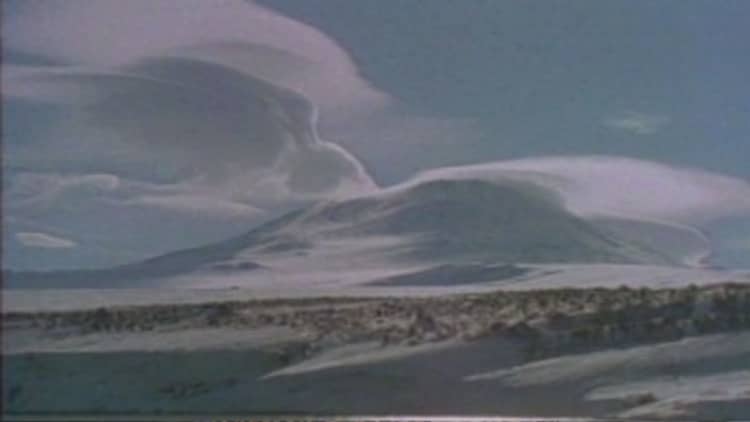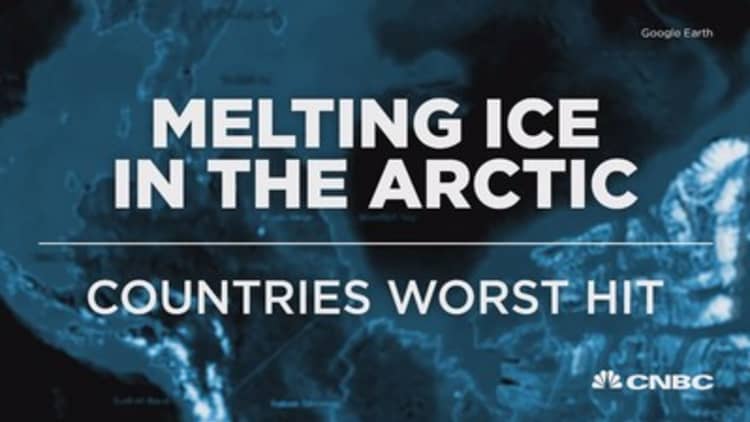
Governments and the private sector are positioning to develop the Arctic, where the wealth of resources is akin to a "new Africa," according to Iceland's president.
The melting of the Arctic is an ongoing phenomenon: In October, about 7.7 million square kilometers (about 3 million square miles) of Arctic sea ice remained, around 1.2 million square kilometers less than the average from 1981-2010, according to calculations by Arctic Sea Ice News & Analysis that was published by researchers at the National Snow and Ice Data Center.
One effect of the melting ice has been newly opened sea passages and fresh access to resources.
"Until 20 or so years ago, (the Arctic) was completely unknown and unmarked territory," Iceland's President Olafur Grimsson told an Arctic Circle Forum in Singapore on Thursday. "It is as if Africa suddenly appeared on our radar screen."
Grimsson cited resources that included rare metals and minerals, oil and gas, as well as "extraordinarily rich" renewable energy sources such as geothermal and wind power.
Developing the Arctic to access these resources "doesn't only have grave consequences," he said, noting that shipping companies had found new, faster sea routes through the area. Grimsson cited Cosco's trial Northern sea journey a couple years ago with a container ship, which was able to travel from Singapore to Rotterdam in 10 fewer days than the normal route, saving on fuel and other costs.
China's state-owned Cosco announced last month that it would begin a regular route through the Arctic Ocean to Europe.
Major investors are already eyeing the Arctic.
"The average economic annual rate of growth in the Arctic region is the highest in the world relative to any country or any economy," Scott Minerd, a managing partner at Guggenheim Partners, said at the forum. Guggenheim manages more than $240 billion.
"For investors, there is an opportunity here to take advantage of the impact of climate change," he said.
Minerd noted that while the cause of climate change might be debated, empirical data indicates it's occurring.
"If you don't believe this is happening, just go to the Arctic and look at it," he said, adding that as an investment manager, he believes it's both prudent and conservative to plan to address climate change as a long-term trend.
One clear beneficiary of the change is the shipping industry, Minerd said. As an example, he cited the shipping route from South Korea, through the Panama Canal, and on to New York. That route is around 13,000 kilometers, while using the Northwest Passage would be only around 5,000 kilometers, he said.
He's not the only one with an eye on the shipping industry.
Singapore, which due to its key location in global shipping lanes has punched above its weight in the maritime industry for nearly 200 years, is watching the development of the Arctic closely.
"The Northern Sea Route, traversing the waters north of Russia, Norway and other countries of the Arctic, could reduce travel time between Northeast Asia and Europe by a third," Singapore's Deputy Prime Minister Teo Chee Hean said at the forum.
He noted that divisions of government-linked Keppel Corp, a conglomerate with interests in rig building, had already built and delivered 10 ice-class vessels and was working with oil companies and drillers to develop a "green" rig for the Arctic.
Teo quoted a 2012 Lloyd's of London report that estimated companies would invest as much as $100 billion in the Arctic over the next decade.
While much of the focus on Arctic investment has been on energy and natural resources -- and the possible environmental impact from mining and drilling -- Minerd called that a "great misconception" about the region.
"I'm never going to say that energy is a non-event, or that natural resources are a non-event, but it's no different than anywhere else in the world," he said, noting that Iceland is already getting most of its electricity from renewable sources.

Minerd points to other opportunities, such as aquaculture, or fish farming, or bio-sciences, such as the development of medicines from unique biology in the region. He noted that it may be difficult for retail investors to access the investments based on the region, but tipped shipping and water plays as potential opportunities. Eventually, he said, there would be public companies that manage ports in the region, but that infrastructure hasn't been built yet.
Indeed, several groups at the forum were seeking investors for infrastructure projects in the region. Greenland Invest's chairman, Svend Hardenberg, was seeking investors for his country's planned airports, while Thomas Mack, president of Aleut Corp., one of Alaska's native-owned companies, was looking for partners to redevelop a former Aleutian island naval base into the Adak International Transport Hub, with a port and airport.
But Iceland's Grimsson warned that the Arctic's development needed to be cooperative, not competitive.
"We need for this part of the planet a coordinated global effort of where the necessary infrastructure is going to be built and executed. That must be done not in a race of one economic player against another, but in a joint cooperative effort and in a comprehensive way," he said. "We can't in fact have harbors everywhere in the Arctic. We cannot have crucial airports everywhere in the arctic."
He emphasized that development of the region must be done in ways that protect the environment.
"What happens in the Arctic has great consequences for every country in every continent," he said, noting that once a quarter of the ice in Greenland melts - as it's on track to do - sea levels globally will rise by about 2 meters (6.6 feet).
In what may also have been a nod to his comparison with Africa -- which was brutally colonized by some European powers --Grimsson noted that development needed to respect the people already living in Arctic regions. That would include the Inuit in Alaska, Northern Canada and Greenland, for example.
Although tropical Singapore was well removed from the Arctic regions, Teo also expressed concern about how the melting ice would impact his country, calling the island-nation "very vulnerable."
He noted that the government had raised the minimum level for newly reclaimed land - a primary way land-starved Singapore develops usable property - by one meter to 2.25 meters above the highest recorded tide levels, although he joked that based on Grimsson's estimates, that only left a quarter-meter to spare. Singapore has also covered about 70 percent of its coast with shore-protection works to prevent erosion, he said.
To be sure, not every Arctic investment so far has gone according to plan.
The Arctic is likely the biggest untapped oil reserve on Earth, holding an estimated 20 percent of the world's untapped resources. But several big oil players have pulled back from the Arctic following a slump in oil prices that has seen the cost of a barrel of crude tumble to below $50 by January 2015 from $110 in June 2014. The price slide placed huge pressure on companies and their highly expensive exploration projects.
In September Royal Dutch Shell became the latest of the oil majors to either postpone or abandon Arctic ambitions. Shell said at the time that it had failed to find enough crude oil so was dropping its search. Drilling there cost roughly $1 billion a year, Shell's oil president Marvin Odum had told CNBC in May.
Earlier in 2015, Norwegian oil group Statoil delayed its Johan Castberg project in the Arctic Circle, citing falling oil prices and high expected operating costs. Russia's Rosneft also postponed exploration this year and France's Total pulled out of a natural gas project in the Russian Arctic. And in December 2014, Chevron suspended its Arctic drilling program in the Beaufort Sea due to low oil prices.
In September, Russia's environmental ministry announced the postponement of all drilling operations on its Arctic Shelf for up to three years, according to media and other reports.
- Katy Barnato contributed to this report.




